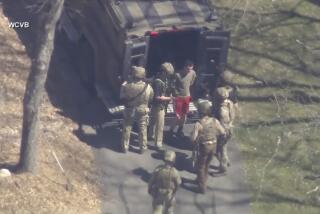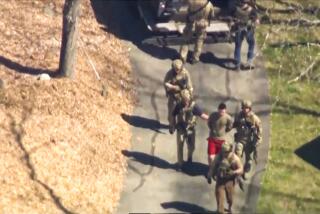Prosecutors Say Article Fueled Peri Spy Dreams
- Share via
Army Spec. Michael A. Peri’s fantasies of espionage were fueled by a magazine article he read about the Marine spy scandal in Moscow, leading him to give military secrets to the East Germans, prosecutors suggested to a court-marital jury in West Germany on Thursday.
Peri seemed fascinated by a Time magazine story he read on Feb. 17, friends told military investigators, and bragged that his security clearance allowed him access to top secret information of the type obtained by the Soviet agents.
“The friends thought the death penalty would be warranted (for the Marine guards who allowed Soviets to view U.S. Embassy documents), and Peri thought prison was enough,” Maj. Michael D. Graham, the Army prosecutor, told jurors.
Defense lawyers, however, described Peri as “a very immature young man . . . who acted out of despair, curiosity and fear.”
The Orange County soldier was isolated and childish, but no spy, defense attorney Michael Christensen said during the first day of Peri’s sentencing hearing Thursday. Peri, 22, pleaded guilty to espionage charges Wednesday.
“The U.S. didn’t bring Michael to justice,” Christensen told jurors, according to a report by Stars and Stripes, the U.S. military’s newspaper for its personnel in Europe. “He did it on his own. He brought himself back to face the consequences of his immature, childlike actions. This is not a spy case.”
Peri, who testified Wednesday that his trip to East Germany on Feb. 20 was prompted by frustration with his military intelligence job, faces a maximum punishment of life in prison. He sat impassively through sentencing arguments Thursday at the Army Community Center in Fulda, West Germany. His parents, Fred and Winnie Peri of Laguna Niguel, attended the first day of court-martial proceedings Wednesday, but left Thursday’s hearing after selection of the jury.
Graham said that three days after Peri read the spy article, he crossed into East Germany with a stolen laptop computer and four floppy discs that contained secret information on how the 11th Armored Cavalry Regiment, the Army’s front-line unit for defense of West Germany, would respond to a Soviet attack. An analysis showed the information had been copied by the East German officials, he said.
The military prosecutor read aloud a 17-page report that had been prepared by military investigators and signed by Peri. The report revealed new details about Peri’s trip to East Germany and eventual surrender.
According to the document, Peri read the Time article during a four-day weekend in the nearby city of Wildfeld, where he and a roommate visited a Peri family friend. After returning on the 20th, Peri was seen at a Fulda bank where he withdrew $120 from a savings account, leaving only $3.
Skipped Special Dessert
Peri then went out to dinner with two friends, but instead of meeting them at a second restaurant, where Peri had suggested they all go for a special dessert, he returned to his barracks in the 11th Armored Cavalry headquarters in Fulda, the report states. Peri packed a sport bag with clothing and then breached security by going unaccompanied into the double-locked vault of the military intelligence unit and taking the computer and discs.
Witnesses told investigators they spotted Peri at several locations on the military post that night, and one soldier reported that he saw Peri in a laundry room, with his face wet as though he had been crying. Flares spotted by West German customs officials at 11:15 that night are believed to have marked Peri’s discovery by East German soldiers, the document stated. Peri had checked out a military vehicle and drove to a spot about a mile from the East German border.
The report revealed little about Peri’s whereabouts or activities in East Germany, information that Peri gave to Army intelligence experts during interviews June 6 to 9 on the condition that it not be used to prosecute him. However, the report stated that while in East Berlin on March 1, Peri signed two declarations, stating that he did not wish to contact U.S. authorities and that he wanted to go to Austria, where he had attended high school when his family lived in Europe in the early 1980s.
East German officials notified U.S. diplomats that Peri had been released to the country of his choice on March 3. Later that day, Peri left the East German capital and traveled by train to Salzburg, Austria, where, he told authorities, he stayed in a 5-star hotel. He said he made no attempt to contact his parents or U.S. officials while in Salzburg, and returned by train to Fulda the next day.
Carried $200 on Return
Peri, who was missing for 12 days, walked through the gates of the post at Fulda and surrendered to military police on March 4. When he was searched, Peri carried the equivalent of about $200 in U.S. and West German currency. It was not revealed where he obtained the additional money.
Although Peri’s attorney, a civilian who is military legal officer for the Utah National Guard, insisted that Peri “did not divulge any important secrets” to East German officials, prosecutors said they will call intelligence experts to testify on the damage caused by his disclosures.
In addition, testimony by Peri’s supervising officer disputed Christensen’s claim that the soldier functions at the level of “a 9- to 11-year-old.”
Capt. Timothy J. Quinn told jurors that he considered Peri “a good, above-average soldier; a smart and trusted kid.” Quinn said Peri had access to “higher than top secret documents” and added that additional security precautions are now taken in the intelligence unit because of the thefts by Peri.
Another Army official testified Thursday that an intensive, three-day search for Peri, begun on Feb. 23 when a military vehicle Peri signed out was found in a shallow ditch just a mile from the East German border, cost $1 million to $1.2 million in salaries, vehicles and aircraft hours.
The sentencing hearing is expected to continue through Saturday.
More to Read
Sign up for Essential California
The most important California stories and recommendations in your inbox every morning.
You may occasionally receive promotional content from the Los Angeles Times.













